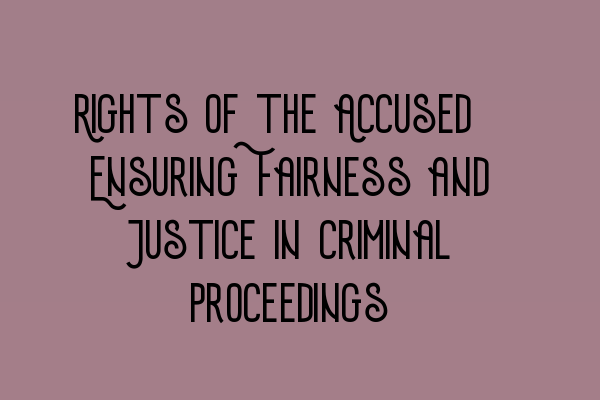Rights of the Accused: Ensuring Fairness and Justice in Criminal Proceedings
When it comes to criminal proceedings, upholding the rights of the accused is of utmost importance. The legal system should provide fairness and ensure justice for all individuals involved. This article will delve into the essential rights that must be upheld during criminal proceedings.
The Right to Legal Representation
One of the fundamental rights of the accused is the right to legal representation. It is crucial for individuals facing criminal charges to have access to competent and experienced lawyers who can provide them with proper legal advice and representation throughout the entire process. The availability of SQE 1 Preparation Courses can help aspiring solicitors acquire the necessary skills to become effective legal representatives.
The Right to a Fair Trial
Every accused person has the right to a fair trial. This includes the right to be presumed innocent until proven guilty, the right to be informed of the charges against them, the right to confront witnesses, and the right to present evidence in their defense. These rights ensure that the accused has every opportunity to defend themselves adequately and ensure a just outcome. SQE 2 Preparation Courses can equip future legal professionals with the knowledge required to protect the rights of the accused.
The Right to Legal Aid
Equally important is the right to legal aid. Not everyone can afford legal representation, and access to justice should not be determined by one’s financial circumstances. Governments and legal systems should provide adequate resources and funding to ensure that those who cannot afford legal representation can still receive expert guidance. SRA SQE Exam Dates can be useful for aspiring solicitors looking to stay updated on the exam schedule.
The Right to a Speedy Trial
A key aspect of ensuring fairness is the right to a speedy trial. Lengthy delays can have a detrimental impact on the accused, both emotionally and financially. Timely resolution of criminal cases allows the accused to move on with their lives or seek rehabilitation if required. A swift trial also reduces the chances of evidence becoming unreliable or witnesses forgetting crucial details.
The Right to Protection Against Self-Incrimination
The right to protection against self-incrimination is another essential element of a fair criminal trial. No one should be compelled to provide evidence that may incriminate them. This right allows the accused to remain silent if they believe that their testimony may be self-incriminating. Lawyers trained through SQE 1 Practice Exam Questions have a thorough understanding of this right and can guide their clients accordingly.
The Right to Appeal
Lastly, the right to appeal forms an integral part of the justice system. If a person believes that an error or injustice occurred during their trial, they have the right to appeal the decision. This right provides a mechanism for correcting possible mistakes and ensuring that justice is served.
In conclusion, upholding the rights of the accused is essential for ensuring fairness and justice in criminal proceedings. These rights include the right to legal representation, a fair trial, legal aid, a speedy trial, protection against self-incrimination, and the right to appeal. It is crucial for legal professionals to be well-versed in these rights to protect the interests and rights of their clients.
For more information on SQE preparation and exam dates, visit SQE Criminal Law & Practice Law UK.
